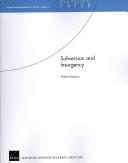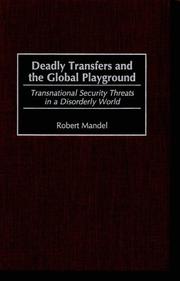| Listing 1 - 10 of 36 | << page >> |
Sort by
|
Book
ISBN: 9029536217 Year: 1995 Publisher: Amsterdam Arbeiderspers
Abstract | Keywords | Export | Availability | Bookmark
 Loading...
Loading...Choose an application
- Reference Manager
- EndNote
- RefWorks (Direct export to RefWorks)
History of Europe --- anno 1940-1949 --- World War, 1939-1945 --- Collaborationists. --- Fifth column --- Quislings --- Collaborationists --- Occupied territories --- Europe
Book
ISBN: 0197627978 0197627951 0197627943 019762796X Year: 2022 Publisher: New York, New York : Oxford University Press,
Abstract | Keywords | Export | Availability | Bookmark
 Loading...
Loading...Choose an application
- Reference Manager
- EndNote
- RefWorks (Direct export to RefWorks)
The invocation of fifth columns in the political arena - whether contrived or based on real fears - has historically recurred periodically and is experiencing an upsurge in our era of democratic erosion and geopolitical uncertainty. Fifth-column accusations can have baleful effects on governance and trust, as they call into question the loyalty and belonging of the targeted populations. 'Enemies Within' systematically investigates the roots and implications of the politics of fifth columns. In this volume, a multidisciplinary group of leading scholars addresses several related questions: When are actors likely to employ fifth-column claims and against whom? What accounts for changes in fifth-column framing over time? How do the claims and rhetoric of governments differ from those of societal groups? How do accusations against ethnically or ideologically defined groups differ?
Subversive activities. --- Internal security. --- Insurgency --- Subversive activities --- Security, Internal --- Sovereignty, Violation of --- Internal security --- Political crimes and offenses --- Fifth column --- Security offenses --- Unconventional warfare --- Insurgency. --- Insurgent attacks --- Rebellions --- Civil war --- Revolutions --- Government, Resistance to
Book
ISBN: 0313390568 9786612573521 1282573527 0313086354 9798216978480 Year: 2006 Publisher: Westport, Conn. : London : Praeger Security International, Bloomsbury Publishing,
Abstract | Keywords | Export | Availability | Bookmark
 Loading...
Loading...Choose an application
- Reference Manager
- EndNote
- RefWorks (Direct export to RefWorks)
Tactics. --- Guerrilla warfare. --- Subversive activities. --- France --- Defenses. --- Fifth column --- Security offenses --- Unconventional warfare --- Insurgency --- Sovereignty, Violation of --- Internal security --- Political crimes and offenses --- War --- Irregular warfare --- Military tactics --- Military art and science
Book
Abstract | Keywords | Export | Availability | Bookmark
 Loading...
Loading...Choose an application
- Reference Manager
- EndNote
- RefWorks (Direct export to RefWorks)
Internal security --- -National security --- -Political crimes and offenses --- -Subversive activities --- -Fifth column --- Security offenses --- Unconventional warfare --- Insurgency --- Sovereignty, Violation of --- Political crimes and offenses --- Offenses, Political --- Political offenses --- Crime --- Extradition --- Political violence --- Subversive activities --- National security --- National security policy --- NSP (National security policy) --- Security policy, National --- Economic policy --- International relations --- Military policy --- Security, Internal --- Law and legislation --- -Government policy --- -Law and legislation --- -Internal security --- Fifth column --- Government policy
Book
ISBN: 9066171308 Year: 1994 Publisher: Amsterdam : De Balie,
Abstract | Keywords | Export | Availability | Bookmark
 Loading...
Loading...Choose an application
- Reference Manager
- EndNote
- RefWorks (Direct export to RefWorks)
Internal security --- -Offenses against public safety --- -Subversive activities --- -#A9406A --- Fifth column --- Security offenses --- Unconventional warfare --- Insurgency --- Sovereignty, Violation of --- Political crimes and offenses --- Crimes against public safety --- Crime --- Public safety --- Security, Internal --- Subversive activities --- Offenses against public safety --- Sociale agogiek --- welzijnswerk en maatschappelijke dienstverlening --- welzijnswerk en maatschappelijke dienstverlening. --- #A9406A

ISBN: 1281181218 9786611181215 0833042815 0833041231 9780833042811 9780833041234 9781281181213 6611181210 Year: 2007 Publisher: Santa Monica, CA Rand
Abstract | Keywords | Export | Availability | Bookmark
 Loading...
Loading...Choose an application
- Reference Manager
- EndNote
- RefWorks (Direct export to RefWorks)
The conflicts in Iraq and Afghanistan have generated intense interest in counterinsurgency within the U.S. armed forces, the intelligence community, the State Department, and the Department of Defense. However, subversion-a critical part of the repertoire of many insurgent groups-remains a neglected subject. This paper presents a set of case studies to explore the elements of subversion in-depth. It discusses preliminary ideas for combating subversive activities in the context of the "long war" against violent Islamist extremism and concludes with a discussion of how American support for count
Counterinsurgency. --- Insurgency. --- Subversive activities. --- Insurgency --- Subversive activities --- Counterinsurgency --- Political Science --- Military & Naval Science --- Law, Politics & Government --- Military Science - General --- Political Theory of the State --- Fifth column --- Security offenses --- Unconventional warfare --- Counterguerrilla warfare --- Insurgent attacks --- Rebellions --- Sovereignty, Violation of --- Internal security --- Political crimes and offenses --- Guerrilla warfare --- Civil war --- Revolutions --- Government, Resistance to

ISBN: 0313028117 9780313028113 9780275962289 0275962288 0275962288 Year: 1999 Publisher: Westport, Conn. Praeger
Abstract | Keywords | Export | Availability | Bookmark
 Loading...
Loading...Choose an application
- Reference Manager
- EndNote
- RefWorks (Direct export to RefWorks)
This comprehensive study provides an integrated analysis of the global security environment and the consequent blossoming of ominous flows or ""deadly tranfers"". It includes the behaviour of rogue states, terrorist groups, transnational criminal organizations and deviant individuals.
National security - International cooperation. --- National security --- Security, International --- Subversive activities --- Crisis management --- Military & Naval Science --- Law, Politics & Government --- Armies --- International cooperation --- Security, International. --- Subversive activities. --- Crisis management. --- International cooperation. --- Crises --- Management of crises --- Fifth column --- Security offenses --- Unconventional warfare --- Collective security --- International security --- Management --- Problem solving --- Conflict management --- Insurgency --- Sovereignty, Violation of --- Internal security --- Political crimes and offenses --- International relations --- Disarmament --- International organization --- Peace
Book
ISBN: 0851170889 Year: 1985 Publisher: London Temple Smith
Abstract | Keywords | Export | Availability | Bookmark
 Loading...
Loading...Choose an application
- Reference Manager
- EndNote
- RefWorks (Direct export to RefWorks)
Authoritarianism. --- Democracy. --- Liberalism. --- Subversive activities. --- Totalitarianism. --- 321.7:342.72/.73 --- Authoritarianism --- Democracy --- Liberalism --- Subversive activities --- Totalitarianism --- 342.72/.73 --- Totalitarian state --- Collectivism --- Despotism --- Dictatorship --- Fascism --- National socialism --- Fifth column --- Security offenses --- Unconventional warfare --- Insurgency --- Sovereignty, Violation of --- Internal security --- Political crimes and offenses --- Liberal egalitarianism --- Liberty --- Political science --- Social sciences --- Self-government --- Equality --- Representative government and representation --- Republics --- Authority
Book
ISBN: 0190096624 0190096608 Year: 2020 Publisher: New York : Oxford University Press,
Abstract | Keywords | Export | Availability | Bookmark
 Loading...
Loading...Choose an application
- Reference Manager
- EndNote
- RefWorks (Direct export to RefWorks)
This book investigates one of the most controversial forms of secret statecraft in international politics: the use of covert action to overthrow foreign regimes. The central question it asks is why leaders sometimes turn to the so-called quiet option when conducting regime change rather than using overt means. Whereas existing works prioritize the desire to control escalation or avoid domestic-political constraints to explain this variation, this book highlights the surprising role that international law plays in these decisions. When states cannot locate a legal exemption from the nonintervention principle-the prohibition on unwanted violations of another state's sovereignty, codified in the United Nations Charter and elsewhere - they are more likely to opt for covert action.
Intervention (International law) --- Sovereignty, Violation of. --- Regime change. --- Espionage. --- Subversive activities. --- United States --- Foreign relations --- Fifth column --- Security offenses --- Unconventional warfare --- Insurgency --- Sovereignty, Violation of --- Internal security --- Political crimes and offenses --- Covert operations (Espionage) --- Operations, Undercover (Espionage) --- Spying --- Undercover operations (Espionage) --- Intelligence service --- Spies --- Change, Regime --- Political violence --- Interim governments --- Legitimacy of governments --- Violation of sovereignty --- Military intervention --- Diplomacy --- International law --- Neutrality

ISBN: 1282352032 9786612352034 0300155018 9780300155013 0300115105 9780300115109 9780300115109 9781282352032 6612352035 9780300168020 0300168020 Year: 2010 Publisher: New Haven : Yale University Press,
Abstract | Keywords | Export | Availability | Bookmark
 Loading...
Loading...Choose an application
- Reference Manager
- EndNote
- RefWorks (Direct export to RefWorks)
With insight and originality, Michael Fellman argues that terrorism, in various forms, has been a constant and driving force in American history. In part, this is due to the nature of American republicanism and Protestant Christianity, which he believes contain a core of moral absolutism and self-righteousness that perpetrators of terrorism use to justify their actions. Fellman also argues that there is an intrinsic relationship between terrorist acts by non-state groups and responses on the part of the state; unlike many observers, he believes that both the action and the reaction constitute terrorism.Fellman's compelling narrative focuses on five key episodes: John Brown's raid on Harpers Ferry; terrorism during the American Civil War, especially race warfare and guerrilla warfare; the organized "White Line" paramilitary destruction of Reconstruction in Mississippi; the Haymarket Affair and its aftermath; and the Philippine-American war of 1899-1902. In an epilogue, he applies this history to illuminate the Bush-Cheney administration's use of terrorism in the so-called war on terror. In the Name of God and Country demonstrates the centrality of terrorism in shaping America even to this day.
Terrorism --- Subversive activities --- Fifth column --- Security offenses --- Unconventional warfare --- Insurgency --- Sovereignty, Violation of --- Internal security --- Political crimes and offenses --- Acts of terrorism --- Attacks, Terrorist --- Global terrorism --- International terrorism --- Political terrorism --- Terror attacks --- Terrorist acts --- Terrorist attacks --- World terrorism --- Direct action --- Political violence --- Terror --- History.
| Listing 1 - 10 of 36 | << page >> |
Sort by
|

 Search
Search Feedback
Feedback About UniCat
About UniCat  Help
Help News
News